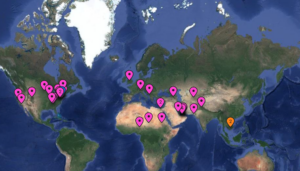
Aloha! And welcome back to another late-night blog post with Aaliyah. Recently, I had a Zoom session with some students from the UEA! Pretty cool right!? We talked a lot about where we were from, what it was like traveling for school, and about some small things like plants and coffee. There were no doubt many differences and similarities between my home, and the homes of my exchange partners, however, the two that struck me as most important from the Zoom session were our differences in perception of what is considered a long travel time and what we considered to be home.
One of our dominant conversations was about the connection we have with our families even though we all moved a ways away for college. This feeling of missing home seemed to be universal, as whether you were in two states, a country, or even 30 minutes away, we all felt a longing for our family. However, one thing that was particular to the US students was that we felt that even being far away from home we never felt alone. In my case, I have family in Delaware and Virginia, which are a few hours away, but the time does not matter because they can still make it to me. This seems the be the same sentiment for the other two Dickinsonians as well. It brought up a good discussion about what was considered “long” travel time. Both of the UEA students considered 30 minutes to get home long a drive, let alone a few hours, whereas I drove 30 minutes on a good day, every day for high school. It was also interesting to see how even my plane ride was longer than one of the UEA students who traveled from another country. It is fascinating to see the cultural difference in how US students are used to traveling long distances without even batting an eye. It may be attributed to the fact that even though the US is huge (with some of our states bigger than other countries) we are still all connected. It is easy to go from one place to another, with road trips being a tradition with many American families. This probably extended into our everyday lives as time went on, creating people willing to drive 45-plus minutes to get to work every day. In comparison to other countries crossing “state” lines means going into another country making it less accessible. Overall it was funny and exciting to talk about.
Our second dominant conversation was about the universal feeling of love we have for our homes. We all bragged about how amazing our home country or states are, as we all felt a lot of pride for our homes. I enjoyed this part of the conversation as you could hear a shift in everyone’s voice from semi-border to excitement. It also brought up the question of what you consider to be your home! For most of us, we talked about where we grew up or were born, but a couple of students had a mix of answers. One of the Dickinsonans students grew up bi-coastal constantly traveling in between, so he shared some of his favorite memories from each place he went. A UEA student was technically from two countries and talked about his time in the UEA and home. For him, home seemed to be wherever he was at the moment, in comparison to one of the Dickinson students who felt a little nomadic because of how much he traveled as a kid. This was one of the first similarities we had with the UEA students. Some define home as a place where you grew up and others as the places where you have been. This conversation showed us how “home” can be the same for two people even if they grew up in different countries and cultures.
So far, I enjoyed talking with and getting to know more about my classmates and the UEA students. I look forward to more discussions of our backgrounds and cultural differences! Have a good night and I’ll see you in the next blog 🙂